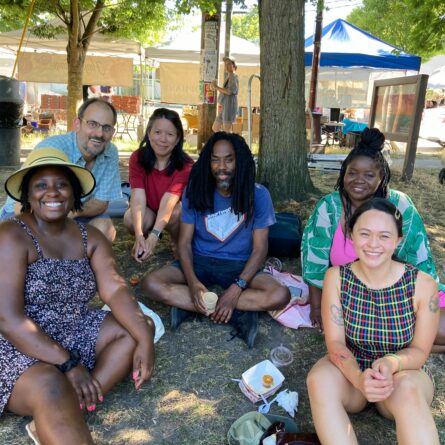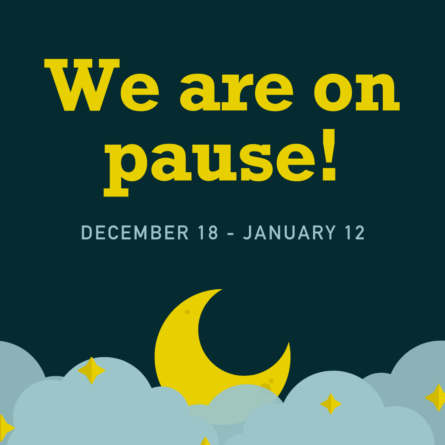
News + Events
Dean Jackson, a 2011 LGBTQ Giving Project Member and founder of Hilltop Urban Gardens, a 2010 and 2011 SJF grantee, shared their story with the guests at Social Justice Fund's Annual Dinner on September 17, 2011. Below are their prepared remarks.
Growing up in the Pacific Northwest, tree hugger was a term given to the mostly white folk environmentalists that received regular mainstream media coverage. These were the people that were out at logging sites protesting the old growth forests being cut down. They were also the people that were out protesting the loss of home for the bald eagle and salmon. I remember hearing about them when I was a youngster in the 80’s and early 90’s… Some group or another had put spikes in a tree, such and such was living in the tree and refused to come out until logging company X stopped clearcutting.
Before grunge and Microsoft, Seattle was almost synonymous with the environmental movement, not to be confused with the environmental justice movement that I learned about so many years later. Flannel shirts, shorts over long johns with big hiking boots, wool touks with the ear flaps, layers – these were the white outdoorsy Northwesterners – and this was a large part of what shaped my early ideas about what was considered the environment, who accessed it, and why.
These were also the Northwesterners who shaped my early ideas of who could not access Nature.
NATURE
My family is black and we didn’t go out into nature. Growing up, nature was a place that you went to. You had to drive there or “hike in”. Often times there was special equipment or gear that was needed. It was not a place you wanted to be unprepared for. And if you were black, it was not a place where you wanted to be alone. Stories floated around about strange things happening in the woods…
After we moved to Seattle in 1979 we would go on ferry rides pretty frequently – park the car, hop on the ferry, ride it to some island and then… ride it back. I don’t recall ever actually getting off the ferry to check out any of the destination ports. I can only imagine what it would have been like back then– a family of six black folks driving around Vashon Island. People rushed to clutch their purses and lock their doors in the suburbs of Seattle…
So my nature excursions were relegated to 3 places:
1. Climbing the trees in my front yard when my parents were not around. Unlike so many of the kids I grew up with – tree climbing was not an activity that was looked upon favorably. My mom had worked in the emergency room of hospitals and would never allow something so “dangerous”.
2. A couple of undeveloped lots in my neighborhood that were still forest, where we would build jumps for our dirt bikes and play superheros. Do kids still play superheroes? Definitely not so much in the remains of old growth forest.
3. The park a couple of blocks from my parents house. It had a pond, trees, a playground and soccer fields/tennis courts.
Poor me, right!?!
I understand that this is lush in comparison to some super urban places or other parts of this continent with different geography. But knowing the wonders of the Northwest as I do now, I feel it’s a total shame that it took so long to find them. And I find the reasons why it took so long to be disgusting.
SAFETY
Back then there was always the safety issue. Even living in the city white people were messed up. Double that with country life, rural geography and gun ownership – you can see where I’m headed when I say I still don’t feel all the way comfortable when I go camping and have to stop in a small town grocery to pick up some supplies.
But it is safe to assume that camping was unheard of in those early years. I had friends who would go camping when I was in my teens. They would pack up their gear and spend the weekends drinking and partying in the woods.
From what I heard about the woods, it was filled with drunk white boys that came from rich families. Privilege abounded in the middle of nowhere – where anything was possible and it was their word against mine. I didn’t have any sort of anti-oppression language or community back then, but thank goodness I did have some real good sense (or intuition) that kept me out of some unsavory situations.
In my developing years Deep Nature was not accessible. White folks had claimed it as their own in the Northwest. That’s hard to imagine right. White folks owning nature? Why, I’ve never heard of such a thing. White folks can’t own nature!
And though the mere thought of something like that is so unimaginable to me today, back in the 80’s it was very real. You were safest in the city – where a woman might clutch her purse, but you weren’t gonna get murdered and fed to pigs (geez, I guess unless you met the green river killer). Nature was something that white people had mastered and you couldn’t go there without the proper tools and knowledge.
Was the Northwest the birthplace of the nature industrial complex? More importantly, could it be true that contrary to my beliefs back then – White folks don’t own nature!
ACCESS
My access to Deep Nature would be postponed. It wasn’t until my early twenties that I actually ventured outside of Seattle for an overnight trip in the woods. It was terrifying and wonderful. That’s a story for another time. A tale of acid, romance, drunk white boys and transformation…
Over a decade later, I have made other trips into nature. Less drugs and drunk white boys, more romance and transformation. The Sand Dunes of the Oregon Coast, the California Redwoods, sandy beaches along the Washington Coast, waterfalls and campsites in British Columbia and other wonderful places that remind me that I am of this earth. They remind me that earth has the power to heal my anxieties and worries, in fact, that earth wants me to give myself up to its healing powers every now and again.
I've learned how to access nature on my terms. I've learned how to redefine what environment means (ie it aint a place you go to, it's wherever you are). I'm able to see my place in nature, as a brown queer, as a critically important connection to maintain while I go about transformational work in community. The challenges to do this work – the trauma, pain, ignorance, hate, fear… are all transferable. The soil will absolutely take them from me. I have no idea how powerful the earth is to heal me (us). But I've caught glimpses that tell me it's in the realm of magic's endless possibilities! For sure!
And that brings me back to tree hugging. There was a time in my mid twenties when I would sit in trees for hours. I would cry, laugh, read, smoke and sometimes even nap. And every time I would offer my pain, doubt, hate, negativity to the tree. And the tree would take it. Sometimes I could literally feel the weight of all that crap shooting into the earth to be dispersed, healed, transformed and perhaps given back to a pal in Gaza.
Tree hugger has a new meaning for me now. It’s about power and healing. A specific blackness that is more about the physical connection with my earth-based roots. A way of being black that I found specifically because I grew up in this mighty whitey Pacific Northwest. A blackness that allows me a path to my brilliance – not mired in a narrow container that tries to tell me what black is. Tree hugger is a term I'll proudly use. It's my blackness at its strongest. My antidote to white dominance. My power focused through a crystal. My tooll to celebrate resistance.
(tree hugger is a work in progress. it's part of my process to explore my profound connection to nature and it's importance in my resistance to white-dominant culture, corporatized societal control, economic systems based on scarcity, and all the other unhelpful elements we meet in daily life. tree hugger is one of the ways i define myself and is an increasingly helpful way for me to understand my blackness growing up in such a white world. more to come)
—
"Founded in 2009, by long-time organizer Dean Jackson, Hilltop Urban Gardens is a community-based urban agriculture and social justice organization. HUG partners with the community to grow healthy food, young people and neighbors. We seek to inspire our community to live with abundance while understanding and undermining the root causes of economic poverty & wealth accumulation and systems of oppression. We believe growing our own food independence is an important strategy in this process."
—
Social Justice Fund continues to build an organization where the value we create is much more than the dollars we grant. All that we achieve is only possible with your support. Please consider renewing your membership or becoming a new member today to support SJF as we build progressive power through donor activism.

